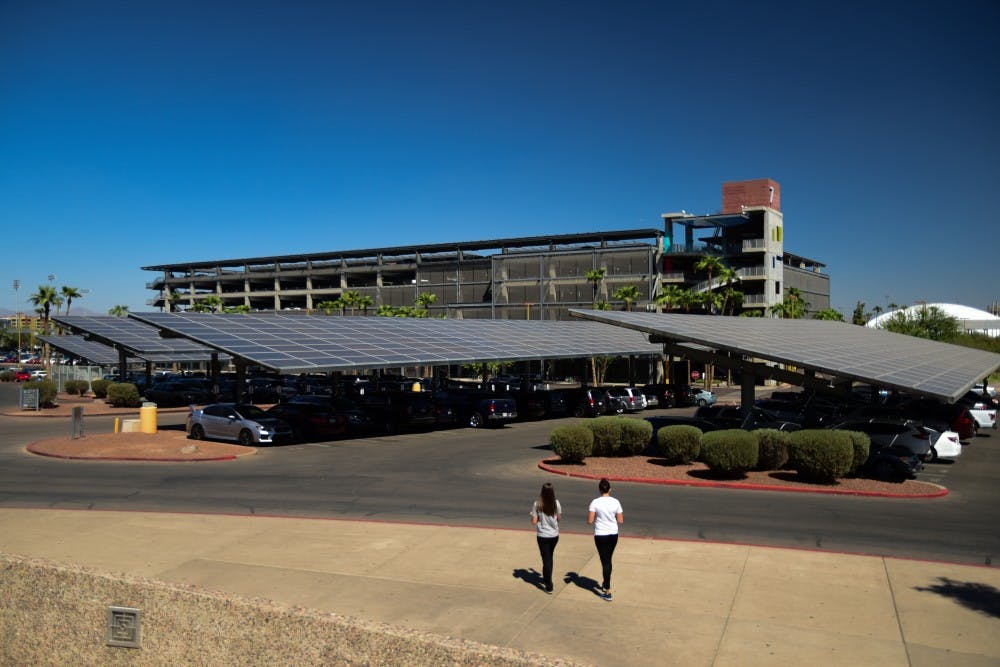The political controversy surrounding clean energy has seeped into all corners of Arizona life, including how ASU academics and students consider the future of solar energy.
Amid pre-election debates about Proposition 127, an initiative that would force the state to increase its clean energy utilization, ASU solar classes are changing the conversation from a strictly scientific perspective to have a more complete understanding of the political implications of renewable energy.
Proposition 127, the Renewable Energy Standards Initiative, would amend Arizona’s constitution by requiring energy utility companies to acquire a certain percentage of electricity from renewable sources every year.
Based on Arizona’s renewable portfolio standards, the minimum amount of electricity derived from renewable resources should hit 15 percent by 2025. Proposition 127 would increase it to 12 percent in 2020 and 50 percent by 2030.
Arizona residents will be able to vote on Proposition 127 on Nov. 6, 2018.
Ronald Roedel, a professor emeritus at the School for Engineering of Matter, Transport and Energy, who deals with solar policy, said the legislation is affecting how students are taught solar policy at ASU.
“I’m teaching a class this semester to graduate students in engineering on solar energy system design, and we talk about policy in this class daily,” Roedel said. “I will have them discuss in class both sides of the issues and then let them make their own minds up.”
Roedel said Proposition 127 teaches a valuable lesson to both sustainability and political science students.
“This gives those students an opportunity to see that every single decision made in the energy business … has technological and business and political or policy components,” Roedel said. “The lesson for the policy students (is) if they get into the political disputes about something that’s brought to the attention of voters, they should try to present the case in a compact … honest approach.”
Arizonans 4 Affordable Electricity Campaign, a campaign which opposes Proposition 127 and is funded by the state's main utility, Arizona Public Service, cited a report by ASU's Seidman Research Institute that said energy costs will rise if the proposition is passed.
Timothy James, an economics professor at ASU and associate at the Seidman Research Institute, was the principal investigator for the report, which said energy costs will rise if the Proposition is passed.
He said Arizona residents will have less money to spend because of Proposition 127, causing the overall state productivity to decrease by $36.8 billion.
“All (of) the people in the state (will have) to spend more money getting the same power after the changes … that would juice their ability to spend money on other goods and services,” James said.
Matt Benson, from Arizonans 4 Affordable Electricity, said the proposition will increase everyone’s utilities bills.
“Every Arizona voter should care about Prop 127 because if this initiative passes it’s going to increase the average Arizona family’s utility bill by a $1,000 a year,” Benson said. “I imagine that it would be especially concerning to college students.”
However, DJ Quinlan, spokesman for Clean Energy for a Healthy Arizona, a major player in support of Proposition 127, said that utility bills will not increase, citing a study from the Natural Resources Defense Council, an environmental advocacy group.
The NRDC found that a clean energy transition to 50 percent would save Arizona residents $3 per month by 2030.
“Prop 127 won’t increase taxes … there will be a cost to implement the proposition overall," Quinlan said. "However, Arizona is (such) a rapidly growing state that you're going to have to get 50 percent more electricity generation in by 2030, so we’re already going to be building this new infrastructure.
Those in opposition to the Proposition said it may lead to the closing of Arizona’s Palo Verde Nuclear Plant, the largest power producer in the country, according to APS.
However, Quinlan said the Palo Verde would be unaffected.
"APS has been lying ... our study says that (the) Palo Verde (Plant) will continue to operate at full capacity regardless of whether Prop 127 passes or not,” Quinlan said. “We have a legal analysis ... that says APS doesn’t even have the authority to shut down Palo Verde even if they wanted to."
But Benson said Proposition 127 will cause the plant to shut down, costing jobs.
“APS and the state agency called the Residential Utility Consumer Office ... said that if Prop 127 passes, Palo Verde will be forced to close by 2029,” Benson said.
James said if Palo Verde were to close, it would hurt Arizona.
“You have to remember that power stations are designed to last … for 30 or 35 years," James said. "If you just built one ten years ago, what you’re effectively doing is a bit like buying a new car (and if) after six months you don’t like it, and you want a brand new one."
Reach the reporter at mzhao49@asu.edu and follow @michelle_zhao23 on Twitter.
Like The State Press on Facebook and follow @statepress on Twitter.




